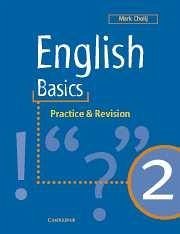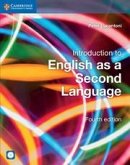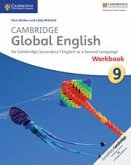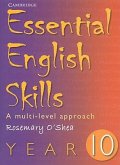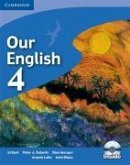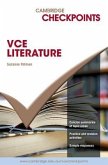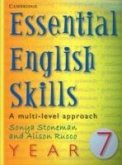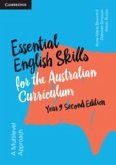26,99 €
inkl. MwSt.
Versandfertig in 2-4 Wochen

13 °P sammeln
- Broschiertes Buch
- Merkliste
- Auf die Merkliste
- Bewerten Bewerten
- Teilen
- Produkt teilen
- Produkterinnerung
- Produkterinnerung
Provides spelling, grammar and punctuation practive for students at Key Stage 3 and/or ESL students.
Andere Kunden interessierten sich auch für
![Introduction to English as a Second Language Coursebook with Audio CD Introduction to English as a Second Language Coursebook with Audio CD]() Peter LucantoniIntroduction to English as a Second Language Coursebook with Audio CD43,99 €
Peter LucantoniIntroduction to English as a Second Language Coursebook with Audio CD43,99 €![Cambridge Global English Workbook Stage 9 Cambridge Global English Workbook Stage 9]() Chris BarkerCambridge Global English Workbook Stage 916,99 €
Chris BarkerCambridge Global English Workbook Stage 916,99 €![Essential English Skills Year 10 Essential English Skills Year 10]() Rosemary O'SheaEssential English Skills Year 1016,99 €
Rosemary O'SheaEssential English Skills Year 1016,99 €![Our English 4 Student's Book with Audio CD Our English 4 Student's Book with Audio CD]() Angela LallaOur English 4 Student's Book with Audio CD19,99 €
Angela LallaOur English 4 Student's Book with Audio CD19,99 €![Cambridge Checkpoints Vce Literature 2006-15 Cambridge Checkpoints Vce Literature 2006-15]() Suzanne PatmanCambridge Checkpoints Vce Literature 2006-1543,99 €
Suzanne PatmanCambridge Checkpoints Vce Literature 2006-1543,99 €![Essential English Skills Year 7 Essential English Skills Year 7]() Alison RuccoEssential English Skills Year 710,99 €
Alison RuccoEssential English Skills Year 710,99 €![Essential English Skills for the Australian Curriculum Year 9 Essential English Skills for the Australian Curriculum Year 9]() Anne-Marie BrownhillEssential English Skills for the Australian Curriculum Year 922,99 €
Anne-Marie BrownhillEssential English Skills for the Australian Curriculum Year 922,99 €-
-
-
Provides spelling, grammar and punctuation practive for students at Key Stage 3 and/or ESL students.
Hinweis: Dieser Artikel kann nur an eine deutsche Lieferadresse ausgeliefert werden.
Hinweis: Dieser Artikel kann nur an eine deutsche Lieferadresse ausgeliefert werden.
Produktdetails
- Produktdetails
- Verlag: Cambridge University Press
- Seitenzahl: 80
- Erscheinungstermin: 17. Juni 1999
- Englisch
- Abmessung: 244mm x 188mm x 5mm
- Gewicht: 186g
- ISBN-13: 9780521648646
- ISBN-10: 0521648645
- Artikelnr.: 23188049
- Herstellerkennzeichnung
- Libri GmbH
- Europaallee 1
- 36244 Bad Hersfeld
- gpsr@libri.de
- Verlag: Cambridge University Press
- Seitenzahl: 80
- Erscheinungstermin: 17. Juni 1999
- Englisch
- Abmessung: 244mm x 188mm x 5mm
- Gewicht: 186g
- ISBN-13: 9780521648646
- ISBN-10: 0521648645
- Artikelnr.: 23188049
- Herstellerkennzeichnung
- Libri GmbH
- Europaallee 1
- 36244 Bad Hersfeld
- gpsr@libri.de
Unit 1. Capital letters
Unit 2. Showing what someone has said
Unit 3. The colon
Unit 4. The dash
Unit 5. The comma 1
Unit 6. The comma 2
Unit 7. More than one (making nouns plural)
Unit 8. Singular or plural? (My family was/were...)
Unit 9. The apostrophe 1
Unit 10. The apostrophe 2
Unit 11. Two words in one (e.g. 'beauty' + 'full' = beautiful)
Unit 12. One word or two? (maybe/may be)
Unit 13. The hyphen
Unit 14. Some troublesome nouns (Is it 'arguement' or 'argument'?)
Unit 15. Some more troublesome nouns (Is it 'humour' or 'humor'?)
Unit 16. Extending words of one syllable (e.g. rub - rubber)
Unit 17. Extending words of more than one syllable (travel - traveller)
Unit 18. Irregular verbs (e.g. do - did - done)
Unit 19. Some tricky verbs (lie/lay
rise/raise)
Unit 20. Some confusing words (practise/practice
affect/effect)
Unit 21. -ible and -able
Unit 22. -ent and -ant
Unit 23. Negative prefixes
Unit 24. adverbs
Unit 25. Making comparisons
Unit 26. 'as' and 'like'
Unit 27. Words that sound alike
Unit 28. Silent letters
Unit 29. Some problems of usage
Unit 30. Common spelling errors.
Unit 2. Showing what someone has said
Unit 3. The colon
Unit 4. The dash
Unit 5. The comma 1
Unit 6. The comma 2
Unit 7. More than one (making nouns plural)
Unit 8. Singular or plural? (My family was/were...)
Unit 9. The apostrophe 1
Unit 10. The apostrophe 2
Unit 11. Two words in one (e.g. 'beauty' + 'full' = beautiful)
Unit 12. One word or two? (maybe/may be)
Unit 13. The hyphen
Unit 14. Some troublesome nouns (Is it 'arguement' or 'argument'?)
Unit 15. Some more troublesome nouns (Is it 'humour' or 'humor'?)
Unit 16. Extending words of one syllable (e.g. rub - rubber)
Unit 17. Extending words of more than one syllable (travel - traveller)
Unit 18. Irregular verbs (e.g. do - did - done)
Unit 19. Some tricky verbs (lie/lay
rise/raise)
Unit 20. Some confusing words (practise/practice
affect/effect)
Unit 21. -ible and -able
Unit 22. -ent and -ant
Unit 23. Negative prefixes
Unit 24. adverbs
Unit 25. Making comparisons
Unit 26. 'as' and 'like'
Unit 27. Words that sound alike
Unit 28. Silent letters
Unit 29. Some problems of usage
Unit 30. Common spelling errors.
Unit 1. Capital letters
Unit 2. Showing what someone has said
Unit 3. The colon
Unit 4. The dash
Unit 5. The comma 1
Unit 6. The comma 2
Unit 7. More than one (making nouns plural)
Unit 8. Singular or plural? (My family was/were...)
Unit 9. The apostrophe 1
Unit 10. The apostrophe 2
Unit 11. Two words in one (e.g. 'beauty' + 'full' = beautiful)
Unit 12. One word or two? (maybe/may be)
Unit 13. The hyphen
Unit 14. Some troublesome nouns (Is it 'arguement' or 'argument'?)
Unit 15. Some more troublesome nouns (Is it 'humour' or 'humor'?)
Unit 16. Extending words of one syllable (e.g. rub - rubber)
Unit 17. Extending words of more than one syllable (travel - traveller)
Unit 18. Irregular verbs (e.g. do - did - done)
Unit 19. Some tricky verbs (lie/lay
rise/raise)
Unit 20. Some confusing words (practise/practice
affect/effect)
Unit 21. -ible and -able
Unit 22. -ent and -ant
Unit 23. Negative prefixes
Unit 24. adverbs
Unit 25. Making comparisons
Unit 26. 'as' and 'like'
Unit 27. Words that sound alike
Unit 28. Silent letters
Unit 29. Some problems of usage
Unit 30. Common spelling errors.
Unit 2. Showing what someone has said
Unit 3. The colon
Unit 4. The dash
Unit 5. The comma 1
Unit 6. The comma 2
Unit 7. More than one (making nouns plural)
Unit 8. Singular or plural? (My family was/were...)
Unit 9. The apostrophe 1
Unit 10. The apostrophe 2
Unit 11. Two words in one (e.g. 'beauty' + 'full' = beautiful)
Unit 12. One word or two? (maybe/may be)
Unit 13. The hyphen
Unit 14. Some troublesome nouns (Is it 'arguement' or 'argument'?)
Unit 15. Some more troublesome nouns (Is it 'humour' or 'humor'?)
Unit 16. Extending words of one syllable (e.g. rub - rubber)
Unit 17. Extending words of more than one syllable (travel - traveller)
Unit 18. Irregular verbs (e.g. do - did - done)
Unit 19. Some tricky verbs (lie/lay
rise/raise)
Unit 20. Some confusing words (practise/practice
affect/effect)
Unit 21. -ible and -able
Unit 22. -ent and -ant
Unit 23. Negative prefixes
Unit 24. adverbs
Unit 25. Making comparisons
Unit 26. 'as' and 'like'
Unit 27. Words that sound alike
Unit 28. Silent letters
Unit 29. Some problems of usage
Unit 30. Common spelling errors.
